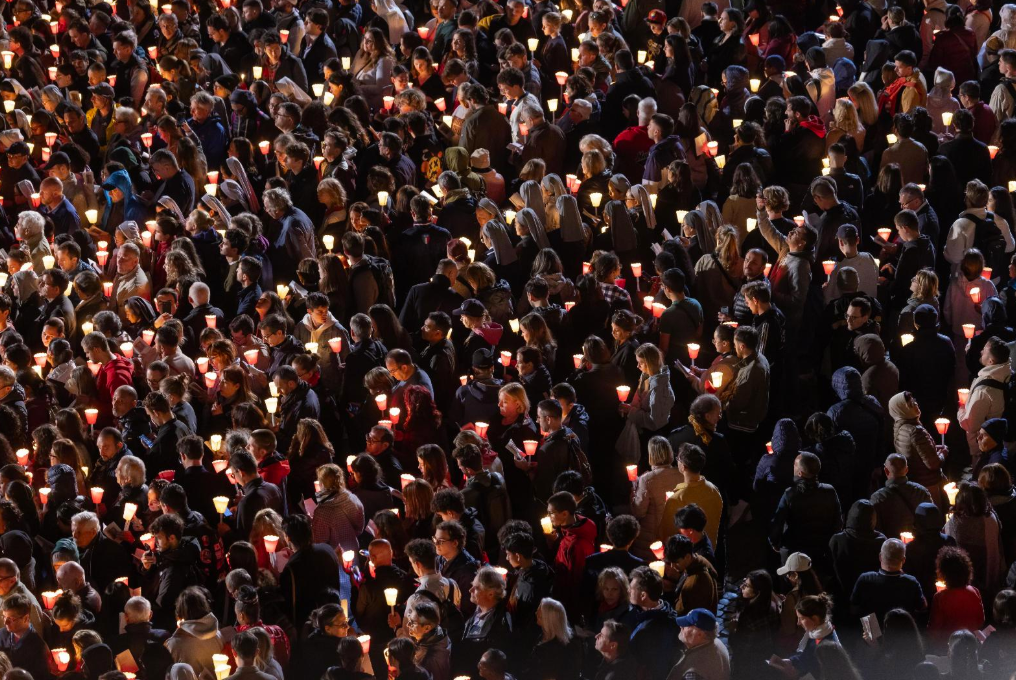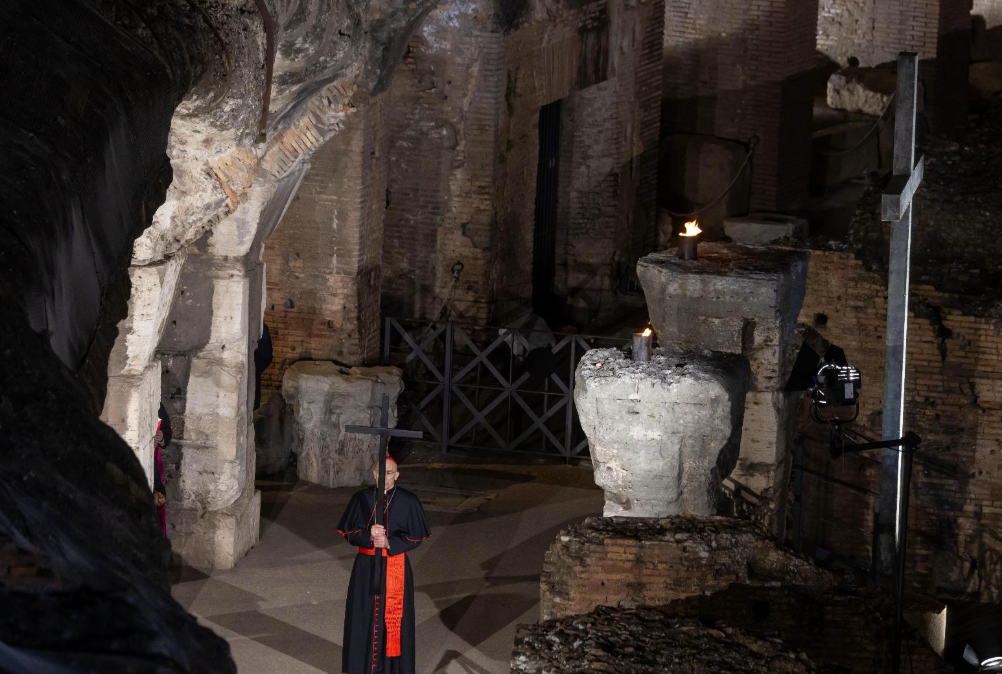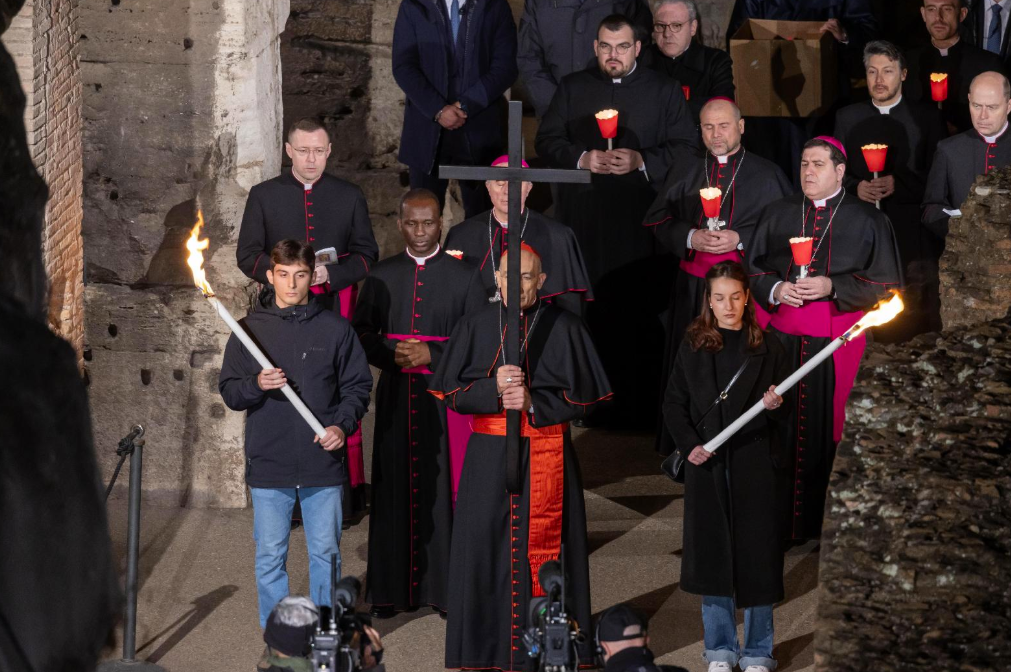Changing the world demands changing direction, pope writes for Way of Cross
ROME (CNS) — Today’s “builders of Babel” are constructing a hell on earth, rejecting everyone they decide are “losers,” Pope Francis wrote in the meditations for the Way of the Cross.
“Your way, Jesus, is the way of the Beatitudes. It does not crush, but cultivates, repairs and protects,” the pope wrote for the nighttime ceremony April 18 in Rome’s Colosseum.
“Today’s builders of Babel tell us that there is no room for losers, and that those who fall along the way are losers. Theirs is the construction site of hell,” he wrote. “God’s economy, on the other hand, does not kill, discard or crush. It is lowly, faithful to the earth.”
Each year, the pope usually chooses a different person or group of people to write the series of prayers and reflections that are read aloud for each of the 14 stations, which commemorate Christ’s condemnation, his carrying the cross to Golgotha, his crucifixion and his burial. However, the pope himself wrote the commentaries and prayers for the Holy Year this year like he did for last year’s Year of Prayer.
For the third year in a row, Pope Francis was scheduled to follow the nighttime Way of the Cross service from his Vatican residence for health reasons as an expected 25,000 people gathered outside the ancient amphitheater.
Cardinal Baldassare Reina, papal vicar of Rome, was designated to fill in for the pope, presiding over the Good Friday ceremony and offering the final blessing at the end. Representatives of different groups were to take turns carrying a bare wooden cross, including: migrants, young people, people with disabilities, volunteers, charity workers, educators and members of “Ordo Viduarum,” a group of widows who serve the church.
The pope’s commentaries and prayers this year looked at how “the road to Calvary passes through the streets we tread each day.”
Jesus came to change the world and, “for us, that means changing direction, seeing the goodness of your path, letting the memory of your glance transform our hearts,” he wrote in his introduction.
“We need only hear his invitation: ‘Come! Follow me!’ And trust in that gaze of love,” and from there “everything blossoms anew,” he wrote, and places torn by conflict can move toward reconciliation, and “a heart of stone can turn into a heart of flesh.”
For the first station, “Jesus is condemned to death,” the pope highlighted how Jesus respects human freedom and trusts everyone by placing himself “in our hands.”
Pilate could have freed Jesus, but “he chose not to,” the pope wrote, asking the faithful to reflect on how “we have been prisoners of the roles we choose to continue playing, fearful of the challenge of a change in the direction of our lives.”
“We can learn marvelous lessons from this: how to free those unjustly accused, how to acknowledge the complexity of situations, how to protest lethal judgments,” the pope wrote, because it is Jesus who is “silently standing before us, in every one of our sisters and brothers exposed to judgment and bigotry.”
“Religious disputes, legal quibbles, the so-called common sense that keeps us from getting involved in the fate of others: a thousand reasons drag us to the side of Herod, the priests, Pilate and the crowd. Yet, it could be otherwise,” he wrote.
For the second station, “Jesus carries his cross,” the pope wrote that the bigger burden is trying to avoid the cross and evade responsibility.
“All we need to do,” he wrote, “is to stop running away and to remain in the company of those you have given us, to bind ourselves to them, recognizing that only in this way can we stop being prisoners of ourselves.”
“Selfishness burdens us more than the cross. Indifference burdens us more than sharing,” the pope wrote.
For the seventh station, “Jesus falls the second time,” the pope underlined how Jesus was not afraid to stumble and fall.
“All those who are embarrassed by this, those who want to appear infallible, who hide their own falls yet refuse to pardon those of others, reject the path that you chose,” he wrote.
“In you, all of us were found and brought home, like the one sheep that had gone astray,” his meditation said.
“An economy in which the ninety-nine are more important than the one is inhumane. Yet we have built a world that works like that: a world of calculation and algorithms, of cold logic and implacable interests,” he wrote.
However, he wrote, “when we turn our hearts to you, who fall and rise again, we experience a change of course and a change of pace. A conversion that restores our joy and brings us safely home.”
In his prayer for the 11th station, “Jesus is nailed to the cross,” the pope asked that people pray to God to “teach us to love” when “we are bound by unjust laws or decisions,” when “we are at odds with those uninterested in truth and justice, and when everyone says, “There is nothing to be done.”
– – – –
Reporting by CNS Rome is made possible by the Catholic Communication Campaign. Give to the CCC special collection in your diocese May 10-11 or any time at: https://bit.ly/CCC-give


